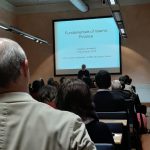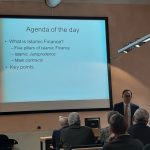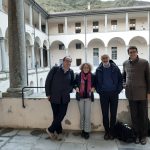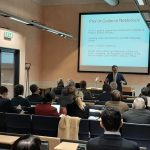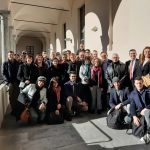Corso di Alta Formazione per
OPERATORI SOCIO-ECONOMICI
CORSO 2
OPERATORI SOCIO-ECONOMICI
Università dell’Insubria – Università OCI
The MENA region is characterized by abundant human and natural resources, accounts for a large share of world petroleum production and exports, and enjoys on average a reasonable standard of living. Within this general characterization, countries vary substantially in resources, economic and geographical size, population, and standards of living. At the same time, intra-regional interaction is weak, being restricted principally to labor flows, with limited trade in goods and services.
From a financial/business point of view, financial systems are – like other emerging markets – bank-based. The importance of islamic banking is growing. In addition to Islamic Windows in traditional banks, there has been a growing presence of exclusively Islamic banks. Islamic finance can be found in over 70 countries, around the world, and it is in continuous and rapid growth: the Islamic banking sector continues to record a strong 50% faster increase than the traditional banking sector and global Islamic investments are destined to grow by over 1500 thousand €.
On the basis of these growing evolutions, the University of Insubria, as part of the PRIMED project, proposes an High Education Program, which allows managers and professionals, even without previous knowledge on the subject, to acquire and update specific skills on a topic so meaningful for the future of international markets. Starting with an overview on the economic framework of the Mediterranean countries, the educational plan focuses on the Islamic finance phenomenon, financial instruments, especially those peculiar to the economic and legal dimension of this sector, highlighting the differences with conventional financial methods.
Teaching is assigned to a top-level Faculty members, selected among leading experts in the field; representatives of leading players in the development of Finance in Italy as well as MENA Countries will intervene.
GENERAL OBJECTIVES
The Advanced Training Course is a specialized training that allows the participant to:
- Understand the economic and financial principles of the Mediterranean countries.
- Evaluate the potential development of Islamic finance.
- Analyze the main techniques of Islamic finance.
- Compare Islamic and conventional finance operations.
- Acquire/ Improve their knowledge about the legal implications of the main Islamic finance techniques.
RECIPIENTS
The course is particularly aimed at:
- Lawyers,
- Chartered Accountants,
- Entrepreneurs and managers who operate or intend to operate in Islamic countries,
- Business consultants,
- Officials of credit institutions, governmental bodies and staff of administrative and tax offices, Journalists.
METHOD
The didactic approach is based on the alternation of theoretical insights, exercises, case analysis and direct interaction with experts in the field.
CONTENTS
The educational program provides a complete picture of the Economic and Finance of Mediterranean Area, from the analysis of the founding principles and the development potential of the sector, to the most operational aspects concerning the individual financial and contractual instruments, the operation of Islamic Banking and the implications for our tax and financial system.
WHEN
To encourage the participation of professionals, the course will be held on Friday afternoons, usually from 14.30 to 17.30, and on Saturday mornings, from 9.30 to 12.30.
REGISTRATION FEES
It is a free program fully financed by MIUR (Italian Ministry of University and Research)
N. MAX PARTECIPANTS
PROGRAMMA DEL CORSO
8 November 2019
14.30 -15.00 “ Greetings and introduction” (Prof. Roberto Mazzola, L’Università degli Studi del Piemonte Orientale “Amedeo Avogadro”)
15.00 – 18.00 “Fundamentals of Islamic finance: theological roots, economic dimension and Technical elements of main products and services (mudharabah, musharakah, murabahah, ijara, sukuk)” (Prof. Cedomir Nestorovic – Economics Department ESSEC Business School)
9 November 2019
9.30 -12.30 “Marketing of Islamic banks and Takaful companies: identification of the target audience, segmentation, and positioning, and 5 Ps of marketing with a specific emphasis on advertising” (Prof. Cedomir Nestorovic – Economics Department – ESSEC Business School)
15 November 2019
14.30 – 17.30 “The Economies and Finance of the Middle East and North Africa: Retrospect and Prospects. Case Study 1” (Prof. Jamus Jerome Lim, Economics Department – ESSEC Business School)
16 November 2019
9.30 – 12.30 “Portfolio Construction in a Large Institutional Sovereign Wealth Fund – Case Study 2” (Prof. Jamus Jerome Lim – Economics Department – ESSEC Business School)
22 November 2019
14.30- 17.30 “The EU Cooperation Policy with the Northern African Mediterranean Countries and the Middle East” (Prof. Giuseppe Colangelo – Department of Law, Economics and Culture – Università dell’Insubria)
23 November 2019
9.30 -12.30 “Framework and functioning of the Islamic Bank and differences with conventional banks” – (Prof. Paolo Biancone – Management Department – Università degli Studi di Torino)
“Application of the legal principles of Islamic finance in our legal system”
(Prof. Fabrizio Vismara – Department of Law, Economics and Culture – Università dell’Insubria)
29 November 2019
14.30 – 17.30 “Islamic Finance to Enhance Business Opportunities” (Michael J.T McMillen – Curtis, Mallet-Prevost, Colt & Mosle LLP; and University of Pennsylvania Law School)
30 November 2019
9.30 – 12.30 “Case Studies: Islamic Finance for Corporate, Commercial, and Private Equity Transactions) (Michael J.T. McMillen – Curtis, Mallet-Prevost, Colt & Mosle LLP; and University of Pennsylvania Law School).



